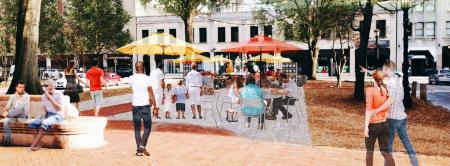Rural Farming to Urban Living
Not long ago, farming played a major role in the economy. Land Grant University Extension, like UMass Extension, began as a way to support agriculture. Still, with city populations rising and climate change ramping up, a shift in extension was needed to improve food systems in urban areas.
This is where Urban Extension comes in. If Extension Leaders create local food systems in urban areas, cities can enjoy fresh local food with a lower carbon footprint. Urban Extension, however, is even broader than agriculture and encompasses all aspects of urban life, including urban design, youth development, inequity, and mental health issues. 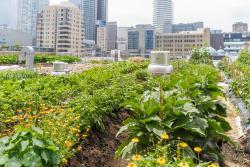
In order to support the mission of Urban Extension leaders, collaboration is needed. For this reason, UMass Extension Assistant Professor, Urban Planner, and Architect Michael DiPasquale planned a conference for universities in the Northeast region to connect and develop urban extension programs.
The NUEL Conference
On June 14, universities gathered to discuss issues, solutions, research, and projects at the Northeast National Urban Extension Leaders (NUEL) conference at the UMass Center in Springfield.
Chair of Northeast NUEL, Michael DiPasquale hosted the event, delivering an opening speech at the start of the conference. DiPasquale helps to implement the mission of NUEL, which is to “advocate and advance the strategic importance and long-term value of urban Extension activities by being relevant locally, responsive statewide, and recognized nationally.”
Northeast Urban Extension is working to “enhance” cities in the Northeast and address their struggles, DiPasquale said. This includes issues regarding climate change and inequity in urban areas.
DiPasquale said that the conference exceeded expectations. About 60 people attended the conference to work together to support urban initiatives. “We attracted a lot of people… from UConn, Rutgers, Cornell,” he said. Many highly accredited universities attended the conference including Pennsylvania State University, the University of Maryland, the University of Rhode Island, the University of Delaware, and the University of the District of Columbia. 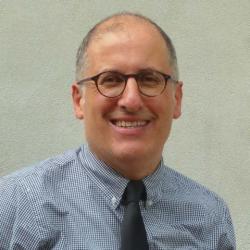
DiPasquale noted how the Northeast differs from other regions of the US in that there are so many major cities close to each other, all struggling with similar problems. The proximity of these cities and universities makes collaboration easier—not to mention, this collaboration is needed.
“This is the first major opportunity to bring people together from the Northeast region” who work in Urban Extension, DiPasquale said. UMass was the first to host a regional NUEL conference since before the pandemic.
Project Proposals and Focus Groups
The Association of Northeastern Extension Directors (NEED) offered an opportunity for Urban Extension professionals to apply for funds for “interstate collaborations that support, advance, or promote Extension Initiatives” that directly impact urban audiences.
The focus groups developed project proposals to be officially proposed in the coming months. Proposals must involve extension professionals from at least two states, encouraging interstate collaboration. Proposals from the conference are due on August 15, 2023.
The conference also consisted of focus groups for in-depth planning and discussion. The focus groups were 4H and Youth Development, Urban Agriculture and Food Systems, Health and Nutrition, Green Infrastructure and Urban Revitalization, Extension Administration, and a General track.
The focus groups were productive by connecting people and developing ideas for urban extension. “When people got into the focus groups, they just took off. They were able to accomplish a lot and make plans to continue to work together,” DiPasquale said.
Exemplary talks
Urban Gardening Program
Many conference attendees presented their urban extension projects, though there were four main “Exemplary Talks.” One of the Exemplary Talks was the University of Maryland East Shore Extension urban gardening project presentation, “Challenges and Opportunities of Urban Agriculture: A Case of Small and Minority Immigrant Producers in Maryland.” 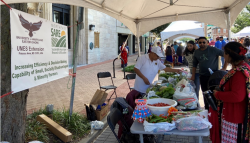
They addressed the challenges urban farmers face, as they are often socially disadvantaged farmers working on a small scale. The presentation described how they are challenged by a lack of resources, gardening knowledge, and risk mitigation and do not benefit from the same support and market access rural farmers receive. Their goal was to promote the efficiency of these farms to increase the consumption of fresh produce in urban areas.
After the intervention of UMES Extension, 90% of farms saw a 20% increase in fresh vegetable intake and a direct economic benefit of ~$14,476 in sales.
Suicide Prevention
One important issue of this generation and of urban populations is suicide prevention. An exemplary program presentation “The Importance of Suicide Prevention,” presented by Chi Catalone, Extension Educator for Penn State focused on the QPR Institute which promotes a method called “Question, Persuade, Refer.”
CPR is a well-known life-saving technique that saves many lives, and QPR can be the same. Where QPR is widely taught, suicide deaths decrease. Penn State offers a two-hour long webinar through the QPR Institute that provides education on how to help someone considering suicide. 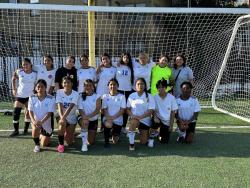
Youth Soccer Program
The University of District of Columbia presented its Healthy Living Program, promoting equity in sports participation through the 4-H Youth Soccer Program.
Youth participation in high-calorie burning sports dropped from 28.7% to 23.9% in just six years, from 2011 to 2017. Participation in sports also increased when parents' income and/or education level increased. Soccer had the highest disparity between family income and participation which was presented in the University of the District of Colombia’s presentation. 
The largest part of the program is the 4-H Summer Soccer Program, but they offer countless opportunities for kids to get involved. This includes the 4-H Indoor Winter League, soccer clinics, fitness camps, overnight camps, travel teams, and coaches’ seminars. They also provide opportunities for youth beyond the scope of soccer, including a nutrition workshop, crime prevention programming, academic counseling, and job opportunities.
Green Infrastructure Program
In 2002, 95% of New Jersey’s waterways were impaired, and 20 years later, 95% of their waterways are still impaired, even after multiple regulatory laws were passed. Not to mention, New Jersey is the most densely populated state, having been hit by Hurricane Ida, Henri, Sandy, and Nor’easters, impacting the state’s water quality. 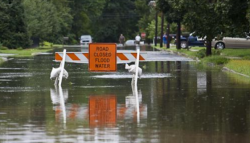
Rutgers Cooperative Extension’s Exemplary Talk explained that current regulations are not improving conditions and that using green infrastructure to retrofit existing systems is a great alternative. Rutgers is helping to advance Green Infrastructure (GI) through education, advocacy, helping communities plan and install GI, and creating local champions to promote GI. 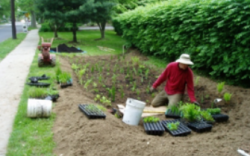
Rutgers was able to provide free training for the Green Infrastructure Champions program, where at the end of the training, champions will have knowledge of GI and stormwater management, be able to engage community leaders and NGOs to adopt GI, secure funding for GI, and publicize implementation of GI through social media.
In the long term, spreading this invaluable knowledge will result in more installations of GI, reducing localized flooding, improving water quality, and making the community more resilient to extreme weather.
The Importance of Urban Extension
DiPasquale noted that there should be many more opportunities for Urban Extension leaders in the Northeast to connect, given the importance and urgency of the work they do.
DiPasquale was impressed with how the conference turned out—both in terms of how many people attended and how well people connected with each other. He explained how much he admires those working in Urban Extension and how they connect with each other. “They’re sweet. They’re generous. They’re just doing remarkable work in the community. They’ve got their heart in it,” he said.
Those who attended made great connections as well as progress in their field. “The conference provides a way to meet in social connection. We went out to dinner together… It was like you were away for a weekend with your family or something,” DiPasquale described. “It was a very lucky, sweet experience to have.”
Urban Extension is becoming a more widely understood form of support for urban areas and food systems, Associate Director of CAFE William Miller said. The work that Urban Extension leaders do is gaining more attention as it is a vital part of efforts to combat climate change and improve life in cities.
Miller said that some of the Extension Leaders that attended do not have colleagues in their community that they can work with. This is why these conferences and continuing collaboration are crucial—to encourage urban extension leaders to bring their brilliant minds together to provoke change.
